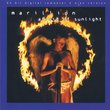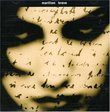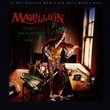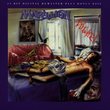| All Artists: Marillion Title: Clutching at Straws (Spec) Members Wishing: 2 Total Copies: 0 Label: Caroline Release Date: 5/18/1999 Album Type: Original recording remastered, Special Edition Genres: Alternative Rock, Pop, Rock, Metal Styles: British Alternative, Progressive, Progressive Rock Number of Discs: 1 SwapaCD Credits: 1 UPC: 724349861121 |
Search - Marillion :: Clutching at Straws (Spec)
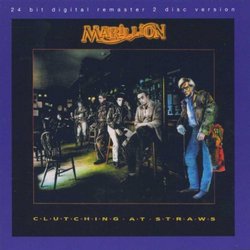 | Marillion Clutching at Straws (Spec) Genres: Alternative Rock, Pop, Rock, Metal
24 bit digitally remastered reissue of the hit prog rockgroup's 1987 album for EMI, complete with a bonus CDfeaturing 12 rare tracks & CD-ROM material. 'Clutching AtStraws', their final album with Fish as vocalist, rea... more » |
Larger Image |
CD DetailsSynopsis
Album Description 24 bit digitally remastered reissue of the hit prog rockgroup's 1987 album for EMI, complete with a bonus CDfeaturing 12 rare tracks & CD-ROM material. 'Clutching AtStraws', their final album with Fish as vocalist, reached #2in the U.K. & contains 12 tracks, including the U.K. top 10smash 'Incommunicado' and the U.K. top 30 hits 'Sugar Mice'& 'Warm Wet Circles'. The extra disc has 'Incommunicado'(Alternative Version), 'Tux On', 'Going Under' (Extended Version) and nine previously unreleased recordings, 'Beaujolais Day', 'Story From A Thin Wall', 'Shadows On The Barley', 'Sunset Hill', 'Tic-Tac-Toe', 'Voice In The Crowd', 'Exile OnPrinces Street', 'White Russians' (Demo) & 'Sugar Mice In The Rain'. A combined total of 24 tracks. Double slimline jewel case. 1999 release. Similar CDs
|
CD ReviewsFirst record is required listening, second is a great transi Marco Pensante | Italy | 07/21/2006 (5 out of 5 stars) "Marillion have always been unique in the field of the good ol' Music Everyone Loves To Hate, i.e. progressive rock. While initially derivative of the genre's 1970s canons -- and this was arguably part of their appeal (*Gimme that old sound again!*) -- they gradually evolved and mutated to tighter song forms, propelled more and more by Steve Rotheray's guitar rather than Mark Kelly's keyboards, Fish's lyrics always firmly grounded in reality, avoiding the genre's (usually) characteristic gobbledygook and psychobabble while remaining literate and complex. "Clutching At Straws" is where this process reaches its climax, with outstanding musicianship and song lyrics by all parties involved. This is possibly one of the darkest albums ever written and played, dealing with the usual trappings of stardom: life on the road, excesses, ultimate loneliness and alienation in the middle of a crowd. Fish's take on the subject, though, is original and full of real-life scenes one can actually visualize and feel a connection with. (The warm wet circles, the woman staring at a brochure. Or try finding an image like "Uzis on a street corner" in a Yes record.) "Clutching At Straws" is probably the best Fish-era Marillion record because of its down-to-earthness. Also, not a single guitar solo or drum roll is gratuitous; Rotheray and the band never play to show off, every note is essential to the songs.
The second record, with the "missing tapes" from the last months of Fish's tenure in the band, is very interesting even though the songs it contains are basically "sketches", not even demos, just reminders for the basic structure of ideas for a new album. There's an exception and it's "Story From A Thin Wall", which is the music from "Berlin" pretty much all mapped out with the lyrics from "Family Business" pretty much all mapped out. The rest of these sketches, in various parts and pieces, were recycled for Marillion's first album with Steve Hogarth and Fish's first solo. They're brilliant historical documents as they shed light on the different combination of talents: Rotheray, Kelly, Trewavas and Mosley, then Fish, and then -- in retrospect -- Steve Hogarth, who has since proven to be an intelligent and worthy replacement by virtue of bringing his own take on the music while never trying to ape his predecessor. It doesn't happen often in music. Makes me curious what might have happened if Marillion, as Mark Kelly says in the liner notes, had taken some time off to recharge the creative batteries thus avoiding the inevitable split. It's one of those pointless exercises that make listening to music more fun." |

 Track Listings (11) - Disc #1
Track Listings (11) - Disc #1